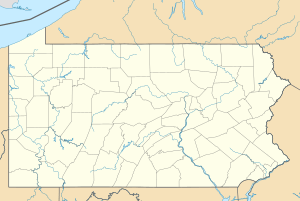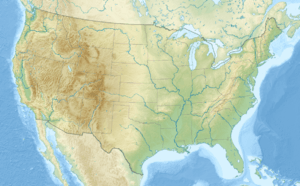Gar Run facts for kids
Quick facts for kids Gar Run |
|
|---|---|
|
Location of Gar Run mouth
|
|
| Other name(s) | Tributary to Brokenstraw Creek |
| Country | United States |
| State | Pennsylvania |
| County | Warren |
| Physical characteristics | |
| Main source | divide between Gar Run and Oil Creek about 2 miles east of Sanford, Pennsylvania 1,775 ft (541 m) 41°46′18″N 079°29′58″W / 41.77167°N 79.49944°W |
| River mouth | Brokenstraw Creek Garland, Pennsylvania 1,286 ft (392 m) 41°46′50″N 079°26′50″W / 41.78056°N 79.44722°W |
| Length | 4.96 mi (7.98 km) |
| Basin features | |
| Progression | northeast |
| River system | Allegheny River |
| Basin size | 18.32 square miles (47.4 km2) |
| Tributaries |
|
| Bridges | Ross Hill Road, PA 27 |
Gar Run is a small stream, about 5 miles (8 kilometers) long, located in Pennsylvania, United States. It flows into a larger stream called Brokenstraw Creek. The Pennsylvania Fish and Boat Commission considers Gar Run a "cold-water fishery." This means its waters are cool enough for certain types of fish, like trout, to live and thrive.
What's in a Name?
Sometimes, streams and places have more than one name over time. The Geographic Names Information System helps keep track of these names. Gar Run has also been known as:
- Crouse Run
Where Gar Run Flows
Gar Run starts in Warren County, Pennsylvania, about 2 miles (3.2 kilometers) east of a town called Sanford. It begins on a high point of land that separates its waters from another stream, Oil Creek. From there, Gar Run flows generally towards the northeast. It eventually joins Brokenstraw Creek in the town of Garland.
The Gar Run Watershed
A watershed is an area of land where all the water drains into a single stream, river, or lake. The Gar Run watershed covers about 18 square miles (47 square kilometers). This area is part of the Pennsylvania High Plateau, a region known for its elevated, flat lands.
The ground beneath the watershed is made up of a type of rock formation called the Venango Formation. On average, the area gets about 42.6 inches (108 centimeters) of rain or snow each year. A large part of the watershed, about 75%, is covered by forests.
 | Emma Amos |
 | Edward Mitchell Bannister |
 | Larry D. Alexander |
 | Ernie Barnes |



